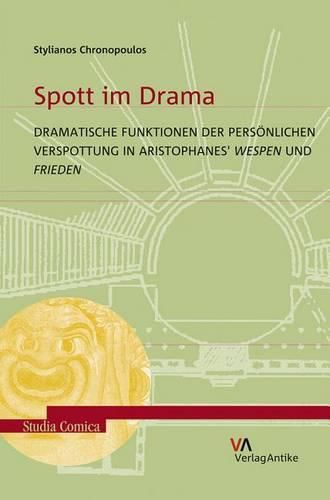Readings Newsletter
Become a Readings Member to make your shopping experience even easier.
Sign in or sign up for free!
You’re not far away from qualifying for FREE standard shipping within Australia
You’ve qualified for FREE standard shipping within Australia
The cart is loading…






Spott im Drama considers the element of personal ridicule in Aristophanic comedy (komoidein), treating it on the basis of the following hypothesis: komoidein is a dramatic element that interacts with other elements such as plot or character and takes on certain literary functions within the drama, not only in the political and historical world outside of it. This is obviously true in the cases of Cleon in Knights or Socrates in Clouds. Conversely, however, the relatively isolated personal jokes, puns, or (seemingly) independent songs often appear to play a purely satirical function. The hypothesis is that even in these cases of komoidein, personal ridicule can be connected with other dramatic elements. This relationship may have considerable interpretative value.The hypothesis is supported by comparing the communicative context of such ridicule in Aristophanes with the contexts of rhetorical invective, the cultic jest, and the sympotic games and applied to two Aristophanic comedies, Wasps and Peace.In the discussion of the Wasps, it is demonstrated that the element of personal ridicule is closely connected to the shaping of the dramatic figures, their characteristics and their roles in the plot, and that it contributes considerably to the creation and presentation of the dialectic relationship between radical change and remaining the same, which is, on my reading, essential for the interpretation of the Wasps.In the discussion of Peace it is argued that personal ridicule serves to create tension in a play that is generally thought to lack it. The tension thus created marks the transitional situation from war to peace that the comedy enacts.
$9.00 standard shipping within Australia
FREE standard shipping within Australia for orders over $100.00
Express & International shipping calculated at checkout
Spott im Drama considers the element of personal ridicule in Aristophanic comedy (komoidein), treating it on the basis of the following hypothesis: komoidein is a dramatic element that interacts with other elements such as plot or character and takes on certain literary functions within the drama, not only in the political and historical world outside of it. This is obviously true in the cases of Cleon in Knights or Socrates in Clouds. Conversely, however, the relatively isolated personal jokes, puns, or (seemingly) independent songs often appear to play a purely satirical function. The hypothesis is that even in these cases of komoidein, personal ridicule can be connected with other dramatic elements. This relationship may have considerable interpretative value.The hypothesis is supported by comparing the communicative context of such ridicule in Aristophanes with the contexts of rhetorical invective, the cultic jest, and the sympotic games and applied to two Aristophanic comedies, Wasps and Peace.In the discussion of the Wasps, it is demonstrated that the element of personal ridicule is closely connected to the shaping of the dramatic figures, their characteristics and their roles in the plot, and that it contributes considerably to the creation and presentation of the dialectic relationship between radical change and remaining the same, which is, on my reading, essential for the interpretation of the Wasps.In the discussion of Peace it is argued that personal ridicule serves to create tension in a play that is generally thought to lack it. The tension thus created marks the transitional situation from war to peace that the comedy enacts.